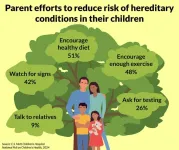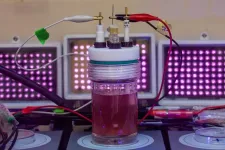(Press-News.org) ANN ARBOR, Mich. – Among things many families don’t wish to pass down to their children and grandchildren: medical issues.
One in five parents say their child has been diagnosed with a hereditary condition, while nearly half expressed concerns about their child potentially developing such a condition, a new national poll suggests.
And two thirds of parents want their healthcare provider to suggest ways to prevent their child from developing a health problem that runs in the family, according to the University of Michigan Health C.S. Mott Children’s Hospital National Poll on Children’s Health.
“This report reflects the need for parents to be equipped with accurate information about their family health history,” said Mott Poll co-director Sarah Clark, M.P.H.
“Parents play a key role in understanding and addressing their child’s health concerns, including those related to hereditary conditions.”
The nationally representative report is based on 2,057 responses of parents of children ages one to 18 years surveyed in February 2024.
Health history knowledge may help reduce risk
A quarter of parents say they have asked healthcare providers to test or examine their child for conditions based on their family history, and 7% say they sought genetic testing for their child.
Parents polled think family history puts their child at higher risk for allergies (41%), mental health conditions (33%), attention deficit/hyperactivity disorder (23%), obesity (22%), heart disease (20%), cancer (20%), alcoholism (18%), autoimmune conditions (13%), autism (6%), or other chronic conditions (29%).
But a quarter of parents think that they can prevent their child from developing a condition that runs in the family.
Family health history may help identify children with a higher-than-usual chance of having common medical disorders, such as heart disease, high blood pressure, stroke, certain cancers, obesity, and type 2 diabetes.
But these are complex disorders influenced by a combination of genetic factors, environmental conditions, and lifestyle choices, Clark says.
When parents have knowledge of their child’s family health history, she says, they can take steps to reduce their child’s risk, such as early screenings, genetic counseling, encouraging healthy eating and exercise habits, and being aware of possible signs and symptoms.
“Having a hereditary predisposition to an illness may prompt parents to be more careful with certain choices,” Clark said.
“A child’s pediatrician can be a resource to help optimize their health and avoid some of the illnesses experienced by their family members.”
Parents less confident about mental health history
Although many mental health conditions have a genetic component, parents polled feel slightly more knowledgeable about their child’s family health history for medical conditions than mental health.
Additionally, parents of older children report talking about family medical history more often than family mental health history with their child.
“Reluctance to openly discuss a family’s mental health history may reflect the stigma represented across generations and cultures,” Clark said.
“Parents can normalize discussions about mental health by integrating them into everyday conversations and encourage open and honest communication within the family about mental health.”
Empowering young people to take the lead
Many parents polled believe their child ages 12-18 could fill out a form about their family health history with their help.
As children near adulthood and get ready to move out on their own, Clark notes, it becomes more important for them to be knowledgeable about their family health history.
“Family history may be crucial for healthcare providers to make informed decisions about treatment options,” Clark said. “Encouraging adolescents to learn about their family health history early on can also empower them to take control of their health and make informed decisions throughout their lives.”
END
2 in 3 parents want help preventing their child from developing hereditary health conditions
A fifth of parents say their child has been diagnosed with a hereditary condition and nearly half worry their kids might be at risk, poll suggests
2024-08-26
ELSE PRESS RELEASES FROM THIS DATE:
Could psychedelic-assisted therapy change addiction treatment?
2024-08-26
by Amy Norton
PISCATAWAY, NJ – After years of being seen as dangerous “party drugs,” psychedelic substances are receiving renewed attention as therapies for addiction -- but far more research is needed, according to a new special series of articles in the Journal of Studies on Alcohol and Drugs, published at Rutgers University.
Psychedelics are substances that essentially alter users’ perceptions and thoughts about their surroundings and themselves. For millennia, indigenous cultures have used plants with psychedelic properties in traditional medicine and spiritual rituals. And for a time in the mid-20th ...
Sustaining oyster farming with sturdier rafts
2024-08-26
Amid the rising human population and pressure on food supplies, the world can’t be everyone’s oyster. But perhaps there might be more oysters to eat if an Osaka Metropolitan University-led research team’s findings mean sturdy plastic rafts will be used in their farming.
Conventional oyster farming uses bamboo rafts with additional flotation devices such as Styrofoam. Though relatively affordable, these rafts can be damaged in typhoons. The OMU-led researchers propose a polyethylene raft that keeps costs manageable but is about five times more durable than a bamboo raft.
OMU Graduate School of Engineering Associate ...
People of lower socioeconomic status less likely to receive cataract surgery in private clinics
2024-08-26
Despite increased funding for cataract surgeries to private, for-profit clinics, access to surgery fell 9% for lower-income people, according to new research published in CMAJ (Canadian Medical Association Journal) https://www.cmaj.ca/lookup/doi/10.1503/cmaj.240414.
“Unexpectedly, despite new public funding for operations provided in private for-profit surgical centres, which was intended to fully cover all overhead costs and remove the need to charge patients, this disparity did not decrease, but instead grew ...
Tick-borne Powassan virus in a child
2024-08-26
With tick-borne viruses such as Powassan virus increasing in Canada, clinicians should consider these infections in patients with encephalitis, as a case study shows in CMAJ (Canadian Medical Association Journal) https://www.cmaj.ca/lookup/doi/10.1503/cmaj.240227.
Although rare, Powassan virus is serious, with a death rate of 10%–15% in people with encephalitis, and it can cause lingering health effects after infection. The virus can transmit within 15 minutes of tick attachment, and symptoms can develop 1–5 weeks later.
In this case study, a 9-year-old child with up-to-date vaccinations ...
Survey finds more than 3 in 4 Americans don’t feel they could help someone suffering an opioid overdose
2024-08-26
EMBARGOED UNTIL 12:01 A.M. AUGUST 26, 2024
NOTE TO EDITOR: (To download broadcast-quality video and other multimedia elements: https://bit.ly/3M2ljhX (password: naloxone)
COLUMBUS, Ohio – International Overdose Awareness Day is a worldwide campaign held each Aug. 31 that acknowledges the grief of family and friends left behind from those who have died from a drug overdose. This year’s campaign theme “Together we can” highlights the power of the community standing together to help end overdose.
However, a new survey of 1,000 Americans from The Ohio State University Wexner Medical ...
How to control your screentime use and make technology work for you
2024-08-26
Many of us feel that we, or our children, spend too much time staring at a screen. From gaming to social media use or ‘doomscrolling,’ it can sometimes feel that we are mindlessly spending hours going down a rabbit hole of technology.
However, according to Catherine Knibbs, a psychotherapist who specializes in cybertrauma and online harms, there are tangible steps we can all take to wrestle back control from the hands of the technology corporations.
In her new book, Managing Your Gaming and Social ...
Matching dinosaur footprints found on opposite sides of the Atlantic Ocean
2024-08-25
DALLAS (SMU) – An international team of researchers led by SMU paleontologist Louis L. Jacobs has found matching sets of Early Cretaceous dinosaur footprints on what are now two different continents.
More than 260 footprints were discovered in Brazil and in Cameroon, showing where land-dwelling dinosaurs were last able to freely cross between South America and Africa millions of years ago before the two continents split apart.
“We determined that in terms of age, these footprints were similar,” Jacobs said. “In their geological and plate ...
Turning bacteria into bioplastic factories
2024-08-23
In a world overrun by petroleum-based plastics, scientists are searching for alternatives that are more sustainable, more biodegradable and far less toxic to the environment.
Two new studies by biologists at Washington University in St. Louis highlight one potential source of game-changing materials: purple bacteria that, with a little encouragement, can act like microscopic factories for bioplastics.
A study led by graduate student Eric Conners found that two relatively obscure species of purple bacteria have the ability to produce polyhydroxyalkanoates (PHAs), natural ...
Researcher finds sound progress in babies’ speech development
2024-08-23
The sounds babies make in their first year of life may be less random than previously believed, according to a language development researcher from The University of Texas at Dallas.
Dr. Pumpki Lei Su, an assistant professor of speech, language, and hearing in the School of Behavioral and Brain Sciences, is co-lead author on two recent articles in which researchers examined the sounds babies make. The results suggest that children in their first year are more active than previously thought in their acquisition of speech.
“We observed in these studies that infant vocalizations are not produced randomly; they form a pattern, producing three categories of sounds in clusters,” ...
Two epicenters led to Japan’s violent Noto earthquake on New Year's Day
2024-08-23
Key takeaways
The 7.5- magnitude earthquake beneath Japan’s Noto Peninsula on Jan. 1, 2024, occurred when a “dual-initiation mechanism” applied enough energy from two different locations to break through a fault barrier – an area that locks two sides of a fault in place and absorbs the energy of fault movement, slowing it down or stopping it altogether.
An international team of researchers led by UCLA graduate student Liuwei Xu, professor Lingsen Meng and UC Santa Barbara’s Chen Ji analyzed a preceding seismic swarm and identified a previously unknown barrier in the region of the swarm.
The team’s data collection methods could ...
LAST 30 PRESS RELEASES:
Asteroid samples offer new insights into conditions when the solar system formed
Fecal transplants from older mice significantly improve ovarian function and fertility in younger mice
Delight for diastereomer production: A novel strategy for organic chemistry
Permafrost is key to carbon storage. That makes northern wildfires even more dangerous
Hairdressers could be a secret weapon in tackling climate change, new research finds
Genetic risk for mental illness is far less disorder-specific than clinicians have assumed, massive Swedish study reveals
A therapeutic target that would curb the spread of coronaviruses has been identified
Modern twist on wildfire management methods found also to have a bonus feature that protects water supplies
AI enables defect-aware prediction of metal 3D-printed part quality
Miniscule fossil discovery reveals fresh clues into the evolution of the earliest-known relative of all primates
World Water Day 2026: Applied Microbiology International to hold Gender Equality and Water webinar
The unprecedented transformation in energy: The Third Energy Revolution toward carbon neutrality
Building on the far side: AI analysis suggests sturdier foundation for future lunar bases
Far-field superresolution imaging via k-space superoscillation
10 Years, 70% shift: Wastewater upgrades quietly transform river microbiomes
Why does chronic back pain make everyday sounds feel harsher? Brain imaging study points to a treatable cause
Video messaging effectiveness depends on quality of streaming experience, research shows
Introducing the “bloom” cycle, or why plants are not stupid
The Lancet Oncology: Breast cancer remains the most common cancer among women worldwide, with annual cases expected to reach over 3.5 million by 2050
Improve education and transitional support for autistic people to prevent death by suicide, say experts
GLP-1 drugs like Ozempic could cut risk of major heart complications after heart attack, study finds
Study finds Earth may have twice as many vertebrate species as previously thought
NYU Langone orthopedic surgeons present latest clinical findings and research at AAOS 2026
New journal highlights how artificial intelligence can help solve global environmental crises
Study identifies three diverging global AI pathways shaping the future of technology and governance
Machine learning advances non targeted detection of environmental pollutants
ACP advises all adults 75 or older get a protein subunit RSV vaccine
New study finds earliest evidence of big land predators hunting plant-eaters
Newer groundwater associated with higher risk of Parkinson’s disease
New study identifies growth hormone receptor as possible target to improve lung cancer treatment
[Press-News.org] 2 in 3 parents want help preventing their child from developing hereditary health conditionsA fifth of parents say their child has been diagnosed with a hereditary condition and nearly half worry their kids might be at risk, poll suggests





